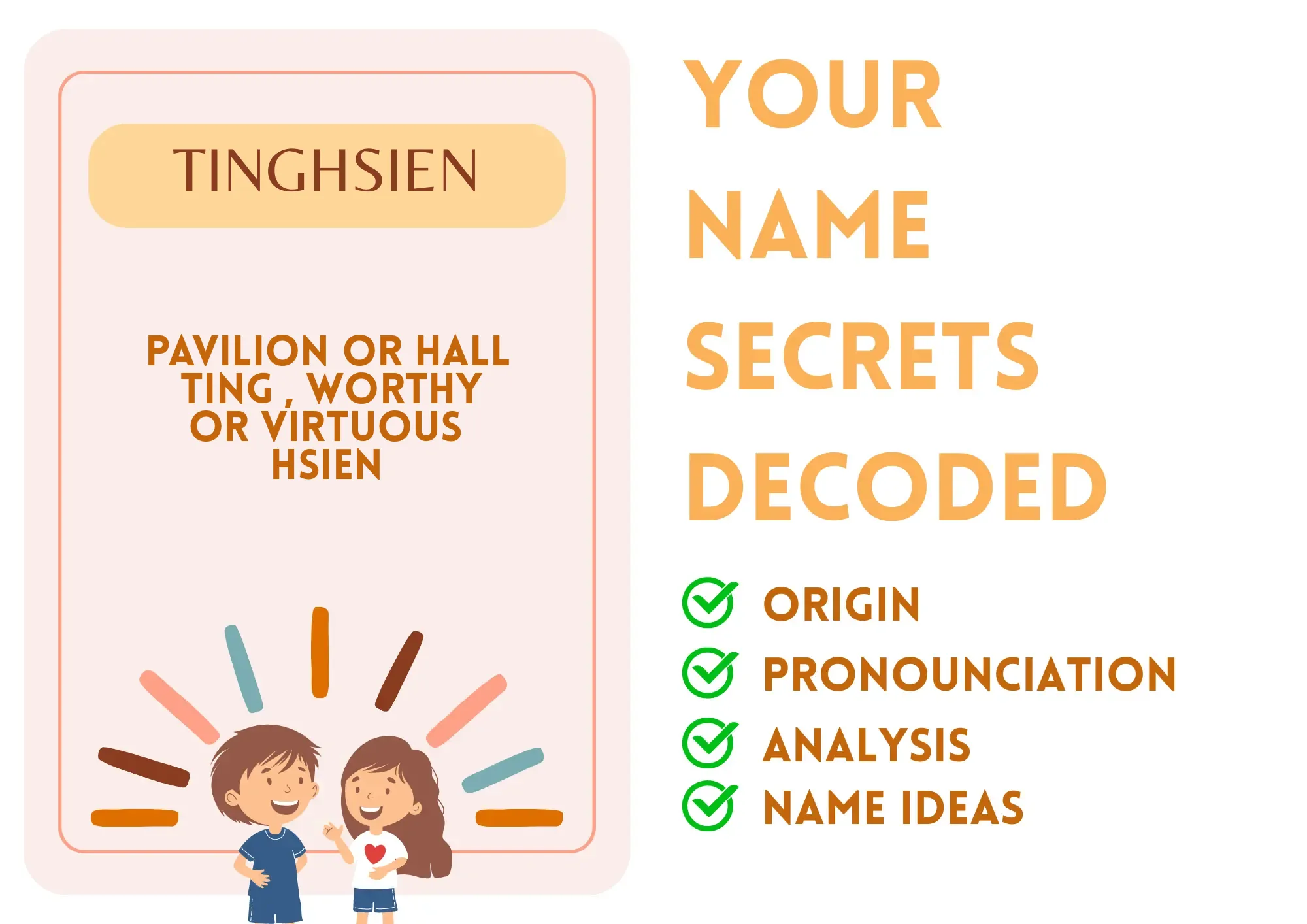
Tinghsien
Tinghsien is a name of Chinese origin, composed of two characters: 'Ting' (亭) which often means 'pavilion' or 'hall,' and 'Hsien' (賢), meaning 'worthy' or 'virtuous.' This name is primarily given to boys in Chinese culture but can also be unisex. It reflects qualities of elegance and virtue, often associating the bearer with grace and moral integrity. The name carries cultural significance in Chinese traditions, symbolizing both beauty in architecture and attributes of a wise character.
In terms of perception, Tinghsien is considered unique and carries a sense of sophistication, appreciated among those who value cultural depth in names. It is relatively easy to pronounce, and the writing may require familiarity with Chinese characters. Common nicknames include Ting or Hsien.
This name is not commonly found in popular culture, though it represents the virtues often celebrated in Chinese literature, folklore, and proverbs.
Basic Information
Gender: Unisex
Sounds Like: Ting-syen
Pronunciation Explanation: The first part 'Ting' sounds like 'ting' as in 'tingle,' and the second part 'hsien' sounds like 'syen,' with a soft 's' and a nasal 'n' ending.
Summary and Meaning
Meaning: Pavilion or hall (Ting), Worthy or virtuous (Hsien)
Origin: Tinghsien originates from Chinese culture, reflecting traditional values and linguistic significance.
Usage: Tinghsien is traditionally used for boys but can also be considered unisex.
Name Number (Chaldean)
Name Number (Pythagorean)
Popularity (Global Rank)
Overall: 1327923
Boys:
Girls: 77177
Most Popular in
Religious and Cultural Significance
Religion: Buddhist
Background: In Chinese culture which often blends Confucian and Buddhist philosophies, names like Tinghsien carry virtues and qualities that are highly esteemed.
Cultural Significance: The name is chosen for its profound implications of grace, wisdom, and nobility, which are celebrated ideals in Chinese society.
Historical Significance: Tinghsien captures historical significance in literature and philosophy, reflecting the appreciation for virtuous qualities in leaders and scholars throughout Chinese history.
Popular Culture
Literature and Mythology: While Tinghsien is not widely referenced in modern literature, names of similar construction often appear in classical Chinese prose and poetry discussing virtue and beauty.
Movies and Television: Characters with similar names may exist, symbolizing elegance and wisdom, though there is no prominent character named Tinghsien found in mainstream media.
Feelings and Perceptions
Perception: Tinghsien is generally perceived positively. It evokes feelings of elegance and virtue, appreciated for its cultural significance and melodic quality.
Positive Feelings: Unique, sophisticated, virtuous, graceful.
Negative Feelings: Some may find the name unfamiliar, as it is not common outside of Chinese-speaking contexts.
Practical Considerations
Ease of Writing and Calling: Tinghsien can be complex to write due to its Chinese characters but is easy to pronounce with two syllables, making it memorable once familiar with the name.
Common Typos and Misspellings: Ting-Shien,Tinghsian,Tingsien
Common Nicknames: Ting,Hsien
Tinghsien Popularity
Tinghsien Usage and Popularity By Country
| Country | Rank (Overall) |
|---|---|
| United States | 344452 |
Tinghsien Usage and Popularity By City
| City | Rank (Overall) |
|---|
Compatibility Analysis
Famous Persons Named Tinghsien
No results found for Tinghsien.
Related Names
Similar Sounding Names:
Tian,Zhen,Xian